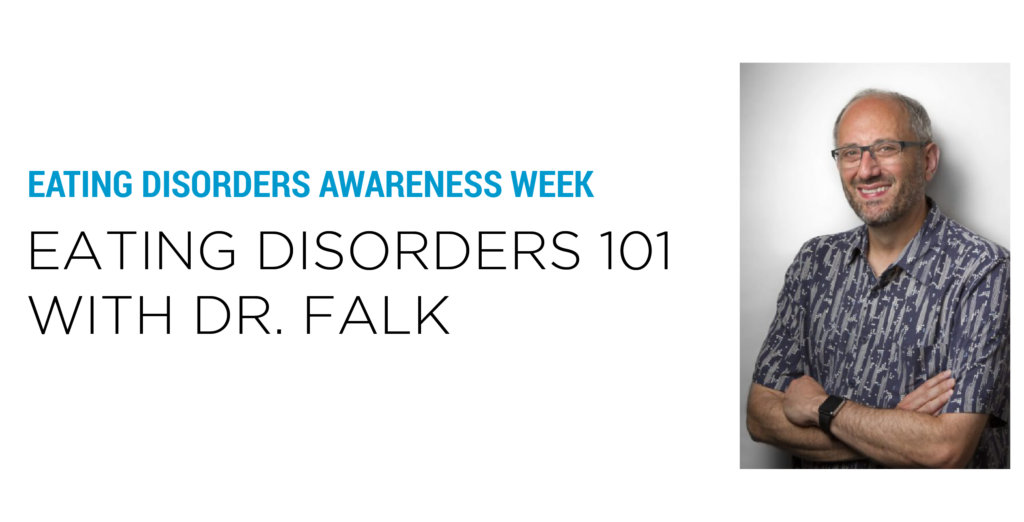February 22, 2021
Eating Disorders 101: National Eating Disorders Awareness Week
 February 22-28, 2021, is National Eating Disorders Awareness Week, as promoted by the National Eating Disorders Association (NEDA). Dr. Neil Falk, Cascadia’s Interim Chief Medical Officer and Associate Medical Director, who provides Diagnosis Training, has given us a quick introduction.
February 22-28, 2021, is National Eating Disorders Awareness Week, as promoted by the National Eating Disorders Association (NEDA). Dr. Neil Falk, Cascadia’s Interim Chief Medical Officer and Associate Medical Director, who provides Diagnosis Training, has given us a quick introduction.
Eating disorders are an often unrecognized issue in mental health, despite them affecting 9% of the US population (about 20 million women, and 10 million men) over their lifetimes.
This may be due to the discomfort of care providers asking about the symptoms, and people being reluctant to acknowledge symptoms. In addition, only 6% of those with an eating disorder are medically diagnosed as underweight, making it easy for providers to neglect to screen for eating disorder symptoms. This can lead to unfortunate consequences, as eating disorders are among the most deadly of mental illnesses, leading to over 10,000 deaths each year in the US (about 1 death every 52 minutes). The economic cost to the US of eating disorders is also estimated at almost $65 billion per year.
Thankfully, eating disorders are highly treatable. 80% of people who engage in treatment achieve full or significant recovery. However, only 5-10% of those with Bulimia Nervosa and Anorexia Nervosa (the most potentially severe types of eating disorders) enter formal treatment. As such, it is vitally important to not overlook the symptoms of eating disorders and to encourage those who may be experiencing symptoms to engage in assessment and/or treatment.
Disproportionality
BIPOC individuals are less likely to be screened for eating disorders than white individuals and are half as likely to be diagnosed with eating disorders or to receive treatment. This disparity exists despite Black and Hispanic individuals having higher rates of bulimia, and Asian Americans having higher rates of restrictive eating, than white individuals.
Eating disorders also affect LGBTQ individuals at a higher level. Gay men are seven times more likely to report binge eating, and 12 times more likely to report purging behaviors than heterosexual men. Transgender college students experience disordered eating 4 times more often than their cis-gender classmates, and gender dysphoria is often linked with eating disorders.
Symptoms and Disorders
The symptoms of eating disorders generally fall into four categories: body image issues, restrictive eating behaviors, binge eating behaviors, and compensatory behaviors. The four most common eating disorders include:
- Avoidant/Restrictive Food Intake Disorder – This diagnosis is made when an individual has difficulty tolerating certain aspects of food (texture, temperature, color, taste, smell, etc.), leading them to decrease their food intake, and become significantly underweight. Such individuals usually do not have body image issues or concerns about weight gain.
- Binge Eating Disorder – This diagnosis is made when an individual has frequent episodes of overeating (often in response to being emotionally stressed) and feeling bad about it afterward. Such individuals may have body image issues or concerns about weight gain.
- Bulimia Nervosa – This diagnosis is made when an individual has the symptoms of Binge Eating Disorder and also engages in activities to decrease the risk of weight gain (“compensatory behaviors”). Common compensatory behaviors include self-induced vomiting, misuse of laxatives or diuretics, excessive exercise, and fasting. Such individuals usually have mild to moderate body image issues and/or concerns about weight gain. However, these individuals usually have normal body weight or are overweight.
- Anorexia Nervosa – This diagnosis is made when an individual has severe body image issues and fears about weight gain, leading them to be highly restrictive in their food intake. Some individuals with this diagnosis may also use compensatory behaviors to prevent weight gain. People with Anorexia Nervosa are usually underweight, often so severely that it can cause medical complications such as heart arrhythmias, dental problems, and organ failure.
If you or someone you know is struggling with an eating disorder and is seeking professional medical help, Cascadia is here for you. Reach out to explore resources and treatment options.
